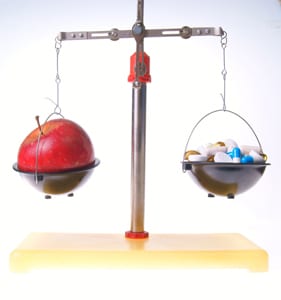June 5, 2017
Supplements And Food
By Michael D. Shaw
A fascinating—if somewhat biased—history of the natural products/supplement industry appears on the blog of health journalist and bestselling author James J. Gormley. Here are a few highlights:
- In the 1890s, millers begin to over-refine wheat and other grains to produce “glistening, nutritionally inadequate white flour.”
- Between 1896-1938, the first health food stores appear in the US.
- In 1938, the Food, Drug, and Cosmetic Act is passed.
- 1965, Dr. Carlton Fredericks’ Low-Carbohydrate Diet is published.
- In the 1990s, the FDA goes after the supplement industry, culminating with the 1994 passage of the Dietary Supplement Health and Education Act, whereby supplements are regulated by the FDA for Good Manufacturing Practice.
- From the late 1990s to the present day, there is still plenty of conflict between the FDA and the supplement industry.
At the heart of much of this discord is the schism between the worlds of proprietary pharmaceutical products, and natural products, available over-the-counter. Actual health claims of pharmaceuticals must be verified via clinical trials, costing hundreds of millions of dollars, not to mention the initial research. Natural products—for the most part non-proprietary—can imply health benefits with a disclaimer, although there is a certain amount of academic research available on many supplements.
However, both models have their flaws. Research and marketing fraud are hardly unknown to Big Pharma, while issues of purity and potency have surely occurred with natural products.
The Council for Responsible Nutrition is the leading trade association representing dietary supplement and functional food manufacturers and ingredient suppliers, and offers these statistics:
Seventy-one percent of U.S. adults—more than 170 million—take dietary supplements, according to the most recent annual survey conducted by Ipsos Public Affairs. The survey also found that the five most popular supplements are multivitamins, vitamin D, vitamin C, calcium, and vitamin B/B complex. Although oldsters (55 and up) show the highest percentage of supplement use (74%) the 18-34 group is not far behind at 70%.
As to the reasons why people take supplements, the survey provided these top three:
1.For overall health and wellness benefits (42%)
2.Energy (30%)
3.To fill nutrient gaps in my diet (28%)
Fair enough, but these results lead us into the old question of synthetic versus naturally-sourced vitamins. And that question asks us to consider whether it is better to optimize nutrition via foods or supplements. The classic answer (“If you have a healthy diet, you shouldn’t need to supplement”) is no answer at all. Even when this non-answer is followed by caveats for the sick, pregnant, and elderly, it is not very helpful.
Still, according to ConsumerLab.com and many other sources, “It is generally best to get your vitamins (as well as minerals) naturally from foods or, in the case of vitamin D, controlled sun exposure.”
Which brings us to Opportuniteas, a natural products company with the simple motto “Better food, better you.” I recently spoke with founder Greg Bastin, who explained that its origins are based on his own frustrations in finding such products for himself.
“Our goal is to help people fill in the gaps in their diet, and improve their nutrition with real food. I believe that natural food in its most natural state is the best thing people should be eating. For me, it’s not about taking the specific vitamins that have been isolated, and have been stripped of all the additional nutrition or phytonutrients that come with them. I want more whole food forms of nutrition; and this has been proven the safest over thousands of years.”
“We offer real foods, put up in convenient powders for specific value propositions: Recovery, or energy, or adding more protein to your diet.”
Greg declares his company’s core principles: Authenticity, Transparency, and Affordability. He hits the transparency issue hard in his blog entry entitled “Food Label Lies.” During our interview, I complimented Greg on this and his other educational content. In one ironic fault of labeling, most potato chip brands ignore their potassium content, yet chips are quite rich in this element, which serves to balance out their sodium content. What’s more, potassium is one of the best examples of how select foods are far superior to bottled supplements, which offer a scant 99 mg per tablet.
Opportuniteas sells direct to the consumer. Check out their e-store.

